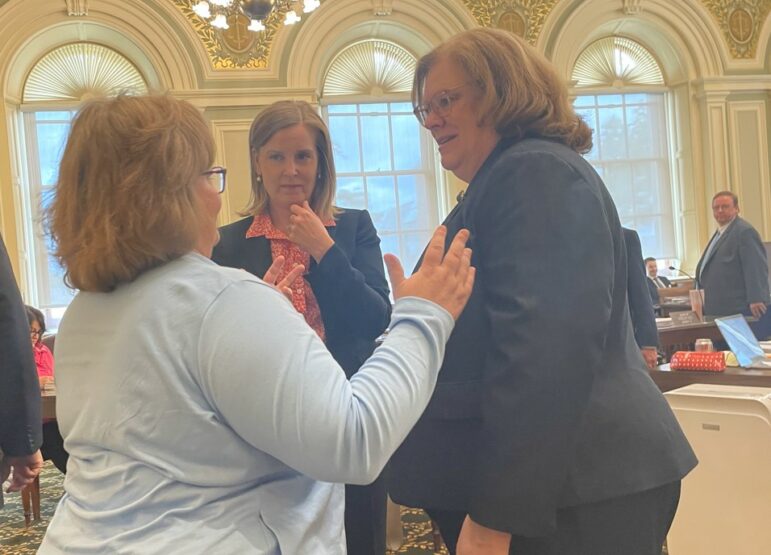By GARRY RAYNO, InDepthNH.org
CONCORD — The state’s utilities, conservation groups, a social service agency and the state Consumer Advocate want the Public Utilities Commission to rehear an energy efficiency plan regulators rejected last month.
The request asks the PUC to stay its order rejecting the three-year plan until there is a rehearing and for the commission to ask the governor and Executive Council to appoint two additional commissioners to rehear the case or a special commissioner.
Currently only one commissioner, chair Daniel Goldner is able to sit on the case, and state law requires a quorum and prohibits orders issued by only one commissioner as occurred earlier this month.
The other current member of the commission, was a PUC and Office of Consumer Advocate staff member and cannot participate in a rehearing and the third commission position is vacant.
The rehearing request claims the PUC’s Nov. 12 order contains errors and denied participants due process rights.
“The Order changed the previously-approved framework for energy efficiency plans without notice, without giving the Moving Parties the opportunity to demonstrate the merits of that framework, without being anchored to evidence in the record,” attorneys for the participating parties wrote, “and without regard to the impact such dramatic and sudden changes will have on the NH Utilities, utility customers, energy efficiency contractors and vendors, and other stakeholders.”
In the long-waited order, the PUC sought to end utility administered energy efficiency programs and instead let a competitive market develop.
The commission rejected the proposal from the state’s electric and gas utilities, the state Consumer Advocate, as well as environmental and social service organizations establishing an expanded three-year program, costing between $350 million and $400 million, and funded by the system benefit charge, proceeds from the Regional Greenhouse Gas Emissions Reduction program and carry over revenues from the forward capacity market program.
The plan sought to increase energy efficiency programs for both residential and commercial customers to reduce the use of electricity and gas.
But the commission rejected the proposed plan and instead said it would be “an enormous burden on New Hampshire ratepayers.” In her final order as commission chair, Dianne Martin wrote residential customers would not receive economic benefits under the plan.
The participants in the energy efficiency agreement disagree with that assessment and say the order fundamentally changes the state’s energy efficiency program.
“A temporary stay is warranted and appropriate because the Order institutes a drastic, disruptive effect on the NH Utilities’ 2021 energy efficiency projects without notice or sufficient due process,” the attorneys wrote. “The Moving Parties also share a fundamental concern that there are several elements of the Order that are not based on sound legal processes and principles, and implementation of many of the directed changes are immediately and significantly harmful to the businesses that offer energy efficiency services in New Hampshire, and the customers that benefit from those programs.”
The parties also contend the order will have a detrimental effect on the 10,000 workers in the energy efficiency sector, many of whom will be laid off.
“In addition to the many foundational changes to New Hampshire’s Energy Efficiency Resource Standard (“EERS”) program, there is lack of clarity regarding implementation of the Commission’s directives for the 2022 and 2023 EERS program plans due to numerous ambiguities contained in the Order,” the attorneys wrote. “Also, there are issues raised within the Order that will require other, further action by the Commission as part of its rehearing and clarification.”
Among the issues raised in the rehearing request is the commission’s rejection of the new “Granite State Test” to measure the costs and benefits of programs.
The PUC approved the test two years ago after a working group developed it at the commission’s urging.
In its order, the PUC said the test is so “dependent on subjective factors such that any desired outcome could potentially be obtained from its application.”
Consumer Advocate Donald Kreis said that claim is not supported by the record.
“No matter what you think of the merits of the order,” Kreis said, “the way the PUC acted was arbitrary and so oblivious to what the record says.”
He said he cannot understand how an order like this can stand.
The PUC energy efficiency order was released Nov. 12 after program proponents waited since Dec. 3, 2020 for the commission’s decision on their proposal.
Instead of expanding the program, the commission approved system benefit rates that reduce over the three years to the 2018 levels and the commission order says they will continue reducing the rate “until they return to a reasonable level.”
The state’s energy efficiency programs are administered by the utilities under the NHSaves banner.
The program has been in place since lawmakers approved separating the costs of generating electricity from the cost of delivery and forbidding utilities from owning generation facilities, or what is also known as restructuring or deregulation.
The three-year energy efficiency proposals began after the commission adopted the concept of energy efficiency resource standards five years ago, and approved the first three-year plan for 2018-2020.
The second three-year plan was rejected in the Nov. 12 order.
The commission cited earlier PUC orders saying they advocated ending utility run programs in favor of letting the private market develop.
“We view this Triennial Plan as an inflection point, with ratepayer-funded and utility managed energy efficiency programs peaking in 2020 and 2021,” the commission wrote in its order “and returning to the intended transition to market-based energy efficiency after this triennium within the guidelines provided by the Legislature.”
The commission called the hike in system benefit charges “a drastic increase” and wrote the proposed three-year agreement by the utilities and others, “does not establish by a preponderance of the evidence that the proposed increases are just, reasonable, and in the public interest. In fact, the record does not even establish by a preponderance of the evidence that the (energy efficiency) program spending and related rates at their current levels are just, reasonable and in the public interest.”
Traditionally, settlement agreements similar to the energy efficiency proposal for the next three years, are approved by the PUC with some adjustments, but are seldom rejected.
The PUC has 30 days to respond to the rehearing request. The participants had until Monday to file their request but they filed it Friday.
Garry Rayno may be reached at garry.rayno@yahoo.com.





